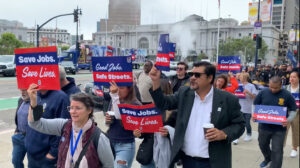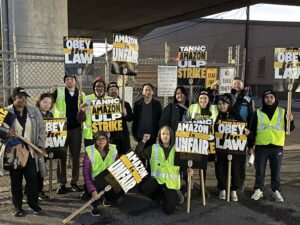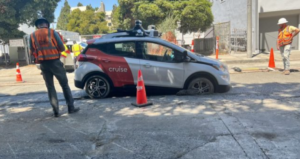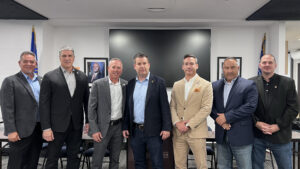“Thank you for the support!”
July 1, 2019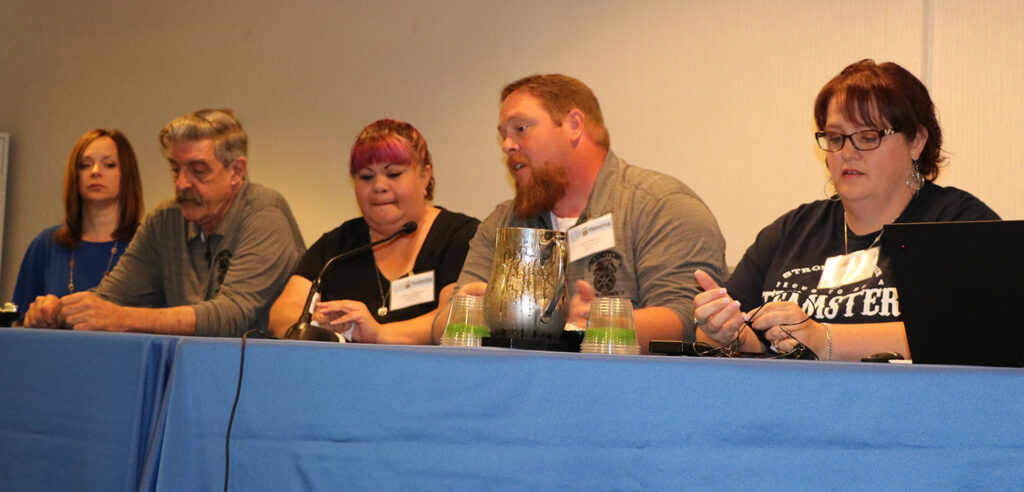
Members burned out in Camp fire testify, “Now we’re Teamster strong.”
On November 8, 2019, the Camp fire ravaged the town of Paradise and surrounding areas of Butte County, destroying over 18,000 structures including 13,000 homes. It was only a few years ago that Local 137 organized the employees of Butte County. The Local also represents workers at TransDev, Coca Cola, Land O’ Lakes, Sysco, Farmer Brothers, UPS, Bimbo and Franz Bakery, all in the fire zone. When the fire came, more than 150 of those members lost their homes.
While the fires were still raging, the Teamsters swung into action. Within days, the local distributed $20,000 in $200 checks to the members who lost their homes or were evacuated. Local 137 Secretary-Treasurer Dave Hawley called the International, and through the Teamster Disaster Relief fund, the IBT sent out a check for $150,000. Then Hawley rallied the Locals of Joint Council 7 and locals across the nation, and together they raised the total to over $325,000. Debit cards and additional checks were then distributed to take care of immediate needs.
Members of Local 137 came to the Joint Council 7 training seminar in Lake Tahoe on June 10 to make a moving presentation about the devastation they endured and the support they received from their Teamster brothers and sisters.
“We lost our home, we lost everything,” says Sarah Kingsley, an Employment and Eligibility Specialist for Butte County. “A lot of people say, well, it’s just furniture. But it’s your grandma’s stuff; it’s ornaments your kids made. It’s a lot of special things.”
Sarah described the sudden realization she had about the harsh reality of her situation. “You don’t realize that when you have nothing, it’s really nothing. For me, without my purse, I had no money or ID. The first ones who came to our aid were the Teamsters. Misty [Business Agent Misty Tanner] brought up gift cards. After that came the checks.”
Sarah said she wanted to thank the Teamsters in person. “Your support enabled us to stay in hotels until our insurance kicked in. I just wanted to say it was really amazing and thank you so much.”
Victoria Sinclaire, who also works for Butte County, says she woke up that morning and went to work. She saw the fire, but it looked to be far away. “There was no news, no evacuation warning, so I wasn’t too worried. I went to my house to round up my daughter, husband, and the dogs. I thought we’d be back in a few days, but that was the last time I saw my house.”
After six-plus hours of terror, thinking she was going to die in an apocalyptic event, she was finally safe and able to contact her family. “The Teamsters came through. There’s something to be said about having brothers and sisters who have your back. I may be strong, but after the fire, I became ‘Teamster Strong.’”
Victoria wanted to give a special thanks to Misty Tanner. “Five weeks after the fire, she came up to help me sift through my property to find anything at all. That’s back breaking labor. She went above and beyond. She came to me as a Teamster sister, without expecting anything in return.”
In the seven months since the fire, Victoria believes that the Teamsters made a difference in her family’s being able to move forward. “My daughter was able to graduate Paradise High on the school’s field. And I welcomed my first grandchild into the world this week. It’s been a busy week! But you guys have been there through it all. Thank you.”
Bruce Dick, a social worker for Butte County just wanted to say thank you—to Joint Council 7, to the International, to the locals, and to the members.
“The Teamsters were the only organization that saw what was going on and came in to help even before FEMA kicked into gear. The Teamsters knew the seriousness of the emergency and got us checks immediately.”
Bruce says that he’d been in his home for 22 years; he raised his son there and considered it his ‘forever home.’ When the fire started, he was already at work and got dispatched to the medically-needy refugee center. “This is where I became very aware of the horror that friends and neighbors were going through as people came in with singed tires, and showed us video on their phones of the horror that took over our town.”
“Having the Teamsters come through with checks and gift cards was great, but it wasn’t just the money,” he adds. “It was the shoulder to cry on.”
Bruce closed by saying that he feels incredibly blessed because, rather than losing community, he “found a community through this fire and that is the International Brotherhood of Teamsters. This community is fireproof!”


